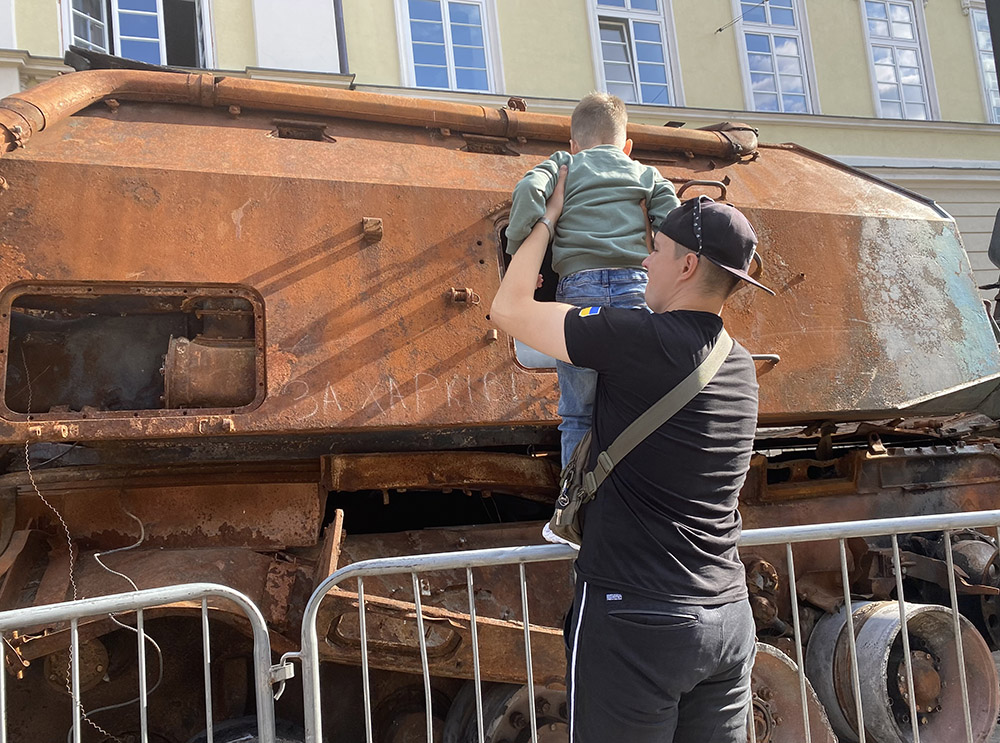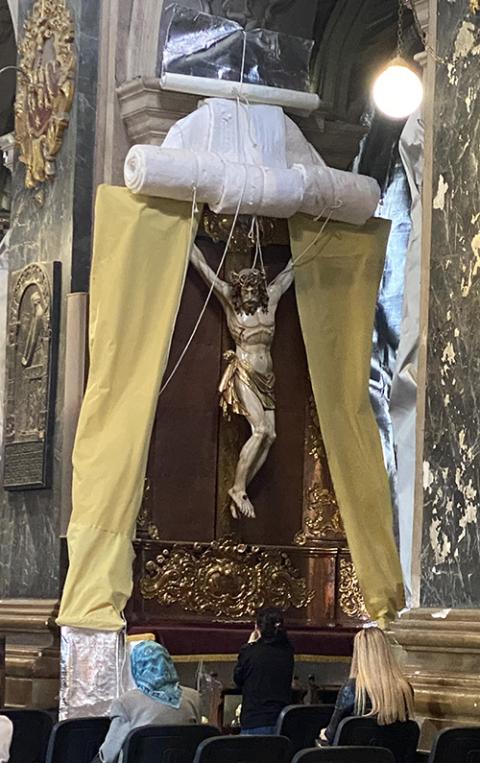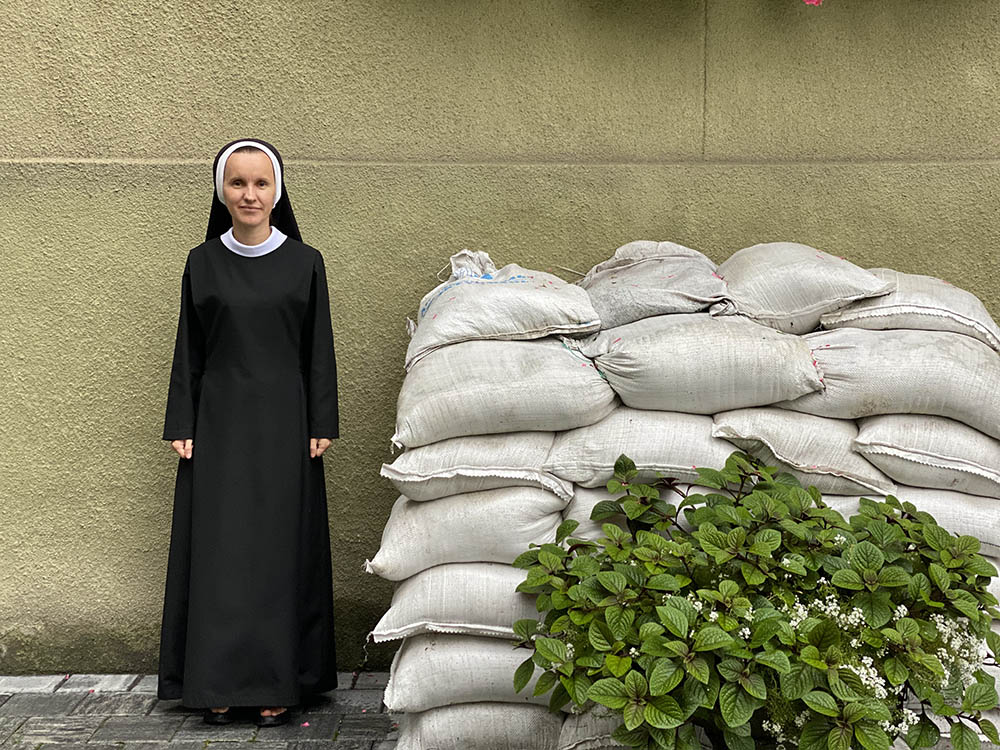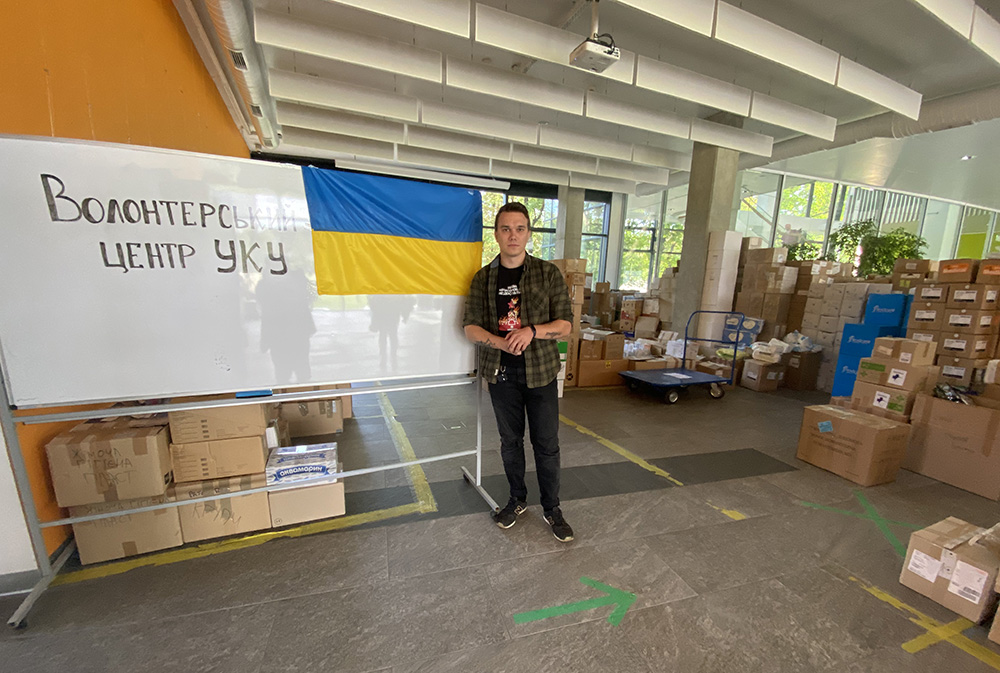
A child gets some help to look at what's left of a Russian tank Sept. 2, 2022 in Rynok Square in Lviv, Ukraine. It was part of a display of tanks and other Russian equipment destroyed by Ukraine's armed forces in the conflict that began Feb. 24, 2022. (Rhina Guidos)
The covered statues inside and outside the churches of Ukraine left me a bit rattled, making me feel as if it were Lent, even though Lent long had passed when I visited there in September 2022.
It's one of the images and feelings I recall as we enter another Lenten season and mark the anniversary of Russia's invasion of Ukraine on Feb. 24. I find myself reflecting on my trip there, the people I met and the examples of courage, resilience and resolve I witnessed.
Ukraine in conflict was the last place I imagined I'd visit, especially after seeing the devastation that began last February. Call it a prompting by the Holy Spirit, but when my friend who had long ties to the country told me she was going for a research project, I asked to go along. That leap into the unknown took me on a long path of meeting Catholics, from inside and outside of the country, helping victims and survivors of this terrible war.
While my friend was busy with her work, I visited Ukrainian Catholics, in churches and convents, the full beauty of their spiritual homes dampened by the sight of thick pieces of padding and cloth that covered the statues of saints and crucifixes, piled up sandbags and large metal panels hiding stained-glass windows — all efforts to reduce potential damage from shrapnel or to save the structures should a missile strike the houses of worship.

Ukrainians pray before a crucifix at the Garrison Church of Sts. Peter and Paul in Lviv, Ukraine, Aug. 3, 2022. A roll of thick padding hangs above the crucifix to protect it in case the church is attacked. (Rhina Guidos)
At the 110-year-old St. Joseph Monastery in the heart of the city of Ivano-Frankivsk, named after a Ukrainian journalist and political activist, I met Basilian Srs. Yeronima Rybakova, principal of St. Basil the Great Catholic School, and Josifa Lesnichenko, who teaches English there, for an article published in October in Global Sisters Report.
It's hard to know what you'll find when you enter into a country in the middle of conflict like Ukraine, but the smiles and hugs of the Ukrainians surprised me and made me think of a popular saying in Spanish among Catholics: "When you feel like it's Good Friday on the inside, act like it's Resurrection Sunday on the outside."
The sisters showed me around their building. A pile of sandbags outside a basement window of their convent was stacked almost as high as Lesnichenko, who nevertheless maintained her serene gaze near the sandbags for a portrait that would never exist except for the war.
They told me about the day the war began in their city. Ivano-Frankivsk, in western Ukraine, was one of Putin's targets on the first day of the war, not because of any strategic purpose but to show Russia's ability to reach that far.
The sisters recalled how they first heard and felt the impact of war when the Russians hit an airport and a military base in their city during those first days, how they opened the monastery's doors to the onslaught of internally displaced people who arrived from the east and how they rushed to move classes online for students whose family felt the need to flee.
They described what happened without drama, just the facts, focused on efforts to help their students, families and fellow Ukrainians struggling through the invasion. They even spoke of plans to help orphans should the war worsen.

Basilian Sr. Josifa Lesnichenko outside the St. Joseph Monastery in Ivano-Frankivsk, Ukraine Sept. 3, 2022 (Rhina Guidos)
I was surprised at the composure of the sisters. War, in Ukraine and elsewhere — for better or worse — has the strange quality of bringing out strength in people, perhaps because there is no other choice.
"And what about you?" I asked the sisters. "Who takes care of you and how are you coping with all of this?"
"God takes care of us," Rybakova replied.
In Lviv, fellow journalist Lilia Kovalyk, also a Catholic, showed me around notable places in the city including the Garrison Church of Sts. Peter and Paul, built by the Jesuits in the 1500s, where many fallen Ukrainian Catholic soldiers, killed in this current war, have been mourned during funeral Masses there. Pieces of weapons, gnarled metal, broken helmets, small and large exploded ammunition have been left at the foot of a crucifix made from a birch tree, the face of Jesus in the middle of a Ukrainian flag.
One set of photos of dead soldiers and another set of portraits of the children they left behind line the path of entry toward the cross.
Advertisement
While Ukrainians want the world to know what's happening to them, they don't easily give in to despair or want pity. Instead, they carry on with their lives and projects in a collective defiance against the worst of times.
At the Ukrainian Catholic University in Lviv, artists gently glue mosaic tiles to the roof and the sides of a chapel at the Church of St. Sophia Wisdom of God, the spiritual heart of the school, even though a missile could demolish their entire work in a single strike.
Whether it's Ukrainian music, art or dance, artists offer up culture as balm to keep up the spirits of those who've decided to stay.
Many of them are like Ostap Machynskyy, 25, head of the rector's office at the university, who has set up a makeshift volunteer center at the college. That's where he organizes donations of gauze, over-the-counter medicine, tourniquets, anything that might come in handy if the war escalates.
Russia's latest incursion is not the first time he's lived through its aggression against his country, he said. There have been other invasions and interferences since Ukraine became independent in 1991, after the fall of the Soviet Union.

Ostap Machynskyy, 25, head of the rector's office at the Ukrainian Catholic University, shows donations he's collected Sept. 2, 2022, on the college's main campus in Lviv, Ukraine. Machynskyy helped set up an improvised volunteer center at the college to collect gauze, over-the-counter medicine, tourniquets, anything that might come in handy if the war escalates. (Rhina Guidos)
Like a lot Ukrainians, he pushes along day by day, adapting to his country's uncertainty, weighing moments of life and death to the tune of the air raid sirens.
I often think of the stunning crucifix I saw inside Lviv's Church of Sts. Peter and Paul, not just because of its beauty but because of the strange roll of protective padding above it. Like the covered statues we see during Lent, it signals that this is not a normal time.
We're supposed to find comfort in contemplating Jesus on the cross, but in all honesty, it's a painful spiritual exercise this Lent when you think about the innocent Ukrainians crucified, for a year now, by this senseless conflict.
The United Nations' human rights office, releasing stats about the war Feb. 21, said that nearly 13,300 have been injured and at last 8,000 civilians, "non-combatants," have been confirmed dead, though the number is likely higher.
Without an end to the conflict in sight, we're left with the words of Psalm 13: "How long, Lord? Will you utterly forget me? ... But I trust in your mercy."





